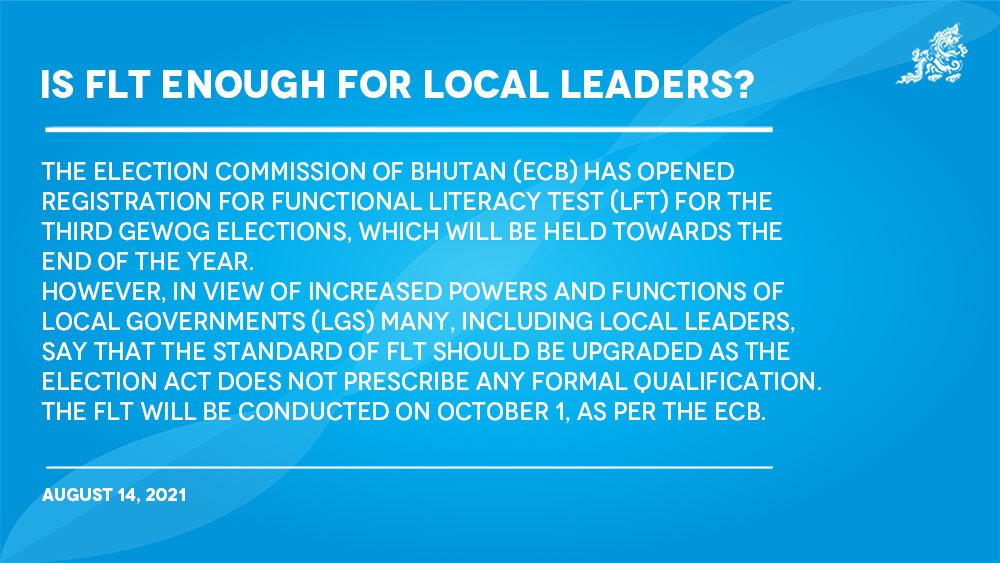MB Subba
The Election Commission of Bhutan (ECB) has opened registration for functional literacy test (LFT) for the third gewog elections, which will be held towards the end of the year.
However, in view of increased powers and functions of local governments (LGs) many, including local leaders, say that the standard of FLT should be upgraded as the election Act does not prescribe any formal qualification. The FLT will be conducted on October 1, as per the ECB.
LGs have been exercising greater flexibility in planning, budgeting and release of budgets in the 12th Plan. About 50 percent of the national budget today is provided to local governments as block grants.
The Centre for Local Governance and Research’s (CLGR) executive director, Tharchen, said questions for FLT should be updated from time to time to meet the requirement of the job. He added that the level of FLT conducted in the past was not adequate in the current scenario.
The CLGR conducts training for local leaders among others activities. Aspiring candidates who possess FLT certificates, including those from the first LG elections, need not take the test again.
Additionally, the government has drafted a national decentralisation policy, which facilitates gradual devolution of power, functions, and authority from the central government to LGs, in which case observers say that the standard of FLT should be increased.
An ECB official said that there was no plan to make changes in the standard of FLT and that the test would be conducted as in the past. “Those who are not really interested to take part in LG elections needn’t register for FLT,” he said.
FLT is conducted by ECB under Section 21(d) of the Election Act which states: “A person shall be qualified to be elected as a member of a Local Government, if he/she is functionally literate and possesses skills adequate to discharge his/her responsibilities as certified by the Election Commission of Bhutan or possessing a formal degree in the case of candidates for Thrompon.”
An observer said that the standard of FLT was set when some of the LG constituencies faced a dearth of candidates as the number of educated candidates coming forward to contest was comparatively less in the first LG election. “Today we don’t have a dearth of candidates in LG elections,” he said.
Gups, especially those who have formal education, are of the view that local leaders must have some level of formal education to carry out their functions effectively. They say that the current FLT gives more weightage to spoken Dzongkha and that it does not meet the standard required to be effective local leaders.
Barp gup Passang Dorji from Punakha said that those without formal education lacked exposure. “A gup or mangmi need not necessarily be a university graduate, but he should have a minimum of Class 10 qualification,” he said.
Trashigang’s Barstsham gup Kezang Dawa said it had become necessary for gups and mangmis to have formal education with increased responsibilities. “But for tshogpas, FLT is enough for now.”
A Samtse gup said that although formal education was not required, it depended on the people’s choice. “Most of the people who are coming forward to contest LG elections today have formal education,” he said, adding that he was encouraging all the educated youths in his gewog to register for FLT.
Another local leader said that a gup and mangmi should be able to read and understand government documents. He said that it was also important for local leaders to be literate in English as not all documents are written in Dzongkha.
The ECB has also issued a notification stating that some aspiring candidates for the upcoming LG elections were carrying out informal election campaigning and that any form of election campaigning is not allowed prior to the notification calling elections.
“Any election campaign before the issue of notification calling the elections shall be construed as being in violation of the electoral laws and shall be dealt with as per the electoral laws,” ECB has warned.
Edited by Jigme Wangchuk


